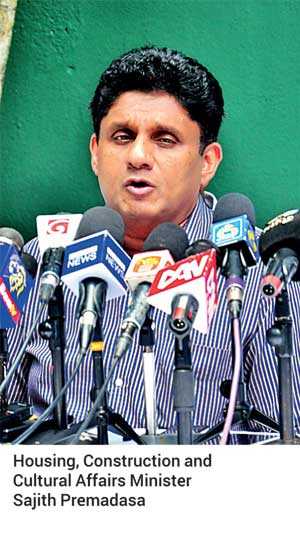Tuesday Feb 17, 2026
Tuesday Feb 17, 2026
Monday, 7 October 2019 01:14 - - {{hitsCtrl.values.hits}}
- Says economic, political and social aspects should be considered as well
- SL must diversify as export destination to improve economic security
- Says eradication of extremism and xenophobia will assure social and political security
By Nuwan Senarathna
United National Party (UNP) presidential aspirant Housing, Construction and Cultural Affairs Minister Sajith Premadasa said a broader outlook is needed to establish national security  calling for a holistic approach that includes military, economic, political and social aspects.
calling for a holistic approach that includes military, economic, political and social aspects.
Speaking at a youth dialogue organised by UNP Youth Movement at New Town Hall, Premadasa said the subject of national security should not be confined to military security. According to Premadasa, the majority of political leaders look at national security from a narrow military or security perspective and leave out many other dimensions important for comprehensive national security.
“If we look at a various interpretations that are given today by a lot of people in the political arena, they are trying to restrict national security into a single area which is military security. I sincerely believe that the subject of national security should be looked at from a very broad perspective,” he said.
He acknowledged that military security should be the priority to establish national security but other aspects related to national security such as economic, political and social security should also be considered
“As far as national security is concerned and more particularly military security, I think we have to focus on the speedy modernisation process for our armed forces. They should be provided with the most appropriate training to face up to the challenges of modern-day terrorism cyber security issues also need to be considered.”
According to Premadasa, morale of armed force should be kept at a high level. He pointed out that security forces should be motivated, which would enable them to face global challenges such as modern terrorism.
Referring to economic security, Premadasa noted the country’s exports needed to be diversified. Premadasa pointed out Sri Lanka’s export markets were confined to a few countries. In his view, when a country’s export destinations are confined to a few countries there can be vulnerabilities due to weak foreign exchange earnings, sensitive diplomatic issues and limited economic growth for the public to benefit from.
“When our export destinations are confined to two or three countries, my view is that Sri Lanka can become economically vulnerable, especially due to trade wars and other global uncertainties. If we are unable to diversify our export destinations, two or three powerful countries might be able to dictate our political agenda,” he argued. Moving on to political and social security, Premadasa said if certain parts of society feel unsafe and insecure, that would impact national security. This could be due to a variety of reasons including increased inequality, limited access to opportunities or perceived discrimination.
“We have to ask if our country is divided and whether extremism, xenophobia and discrimination are perpetuated. Is that not a threat to national security? If certain sections of our society feel unsafe, if they feel insecure, if they feel they do not have rights or those rights are limited, I think that is a major problem as far as our national security strategy is concerned,” he argued.
He argued promoting social harmony and togetherness and working to eradicate xenophobia and extremism would holistically enhance national security.